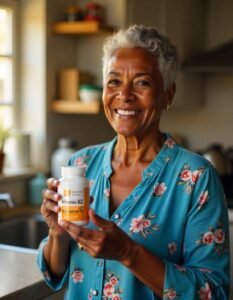
As we age, our bodies undergo numerous changes that affect how we metabolize nutrients, build and maintain muscle, and regulate weight. While the foundations of health remain consistent throughout life, our nutritional needs evolve—especially when it comes to protein. Far from being just a concern for bodybuilders and athletes, protein intake becomes increasingly crucial as we enter our 50s, 60s, and beyond, particularly for those focused on maintaining a healthy weight and promoting longevity.
The Aging Body’s Changing Relationship with Protein
The human body naturally loses muscle mass as it ages—a condition known as sarcopenia. Beginning around age 30, adults lose an average of 3-8% of their muscle mass per decade, with this rate accelerating after age 60. This gradual loss has profound implications for metabolism, mobility, and overall health.
Why does this matter? Muscle tissue is metabolically active, burning more calories at rest than fat tissue. As muscle mass decreases, our resting metabolic rate slows, making weight management increasingly challenging. This creates a troubling cycle: lower metabolism leads to easier weight gain, which can further reduce mobility, leading to additional muscle loss.
Protein serves as the primary building block for maintaining and rebuilding muscle tissue. Research has consistently shown that older adults require more protein than their younger counterparts to stimulate the same muscle protein synthesis response—the process through which the body repairs and builds muscle.
The Weight Loss Challenge in Later Years

Weight management becomes noticeably more difficult with age. Beyond the metabolic slowdown associated with muscle loss, hormonal changes also play a significant role. Decreases in growth hormone, testosterone (in men), and estrogen (in women after menopause) all contribute to changes in body composition that favor fat accumulation over muscle maintenance.
This is where strategic protein intake becomes invaluable. A higher protein diet offers several specific advantages for older adults looking to manage their weight:
Enhanced Satiety
Protein is dramatically more filling than carbohydrates or fats. This satiety effect becomes even more important as we age, when appetite regulation may become less efficient. Studies show that increasing protein intake can significantly reduce overall calorie consumption without conscious restriction.
One notable study demonstrated that participants who increased their protein intake by just 15% naturally consumed about 400 fewer calories daily, leading to approximately 5kg (11 pounds) of weight loss over 12 weeks—with no other intentional dietary changes.
Elevated Thermic Effect
Our bodies burn calories to digest the food we eat—a process called the thermic effect of food (TEF). Protein has a substantially higher TEF than either carbohydrates or fats, with up to 30% of protein calories being burned during digestion.
For older adults with slower metabolisms, this difference becomes particularly meaningful. Research suggests that high-protein diets can increase daily calorie burn by up to 200 calories without any increase in physical activity.
Preservation of Muscle During Weight Loss
When losing weight, particularly over extended periods, some muscle loss typically occurs alongside fat loss. However, for older adults who already face natural muscle decline, preserving lean mass during weight loss becomes critical.
Multiple studies confirm that higher protein intake, especially when combined with resistance training, significantly reduces muscle loss during calorie restriction. This preservation of metabolically active tissue not only makes weight management more sustainable but directly supports longevity.
Protein and Longevity: The Connection
The link between adequate protein intake and longevity extends beyond weight management. Research increasingly suggests that maintaining muscle mass as we age correlates strongly with lower all-cause mortality rates and improved quality of life in later years.
Adequate muscle mass supports:
- Better glucose metabolism and insulin sensitivity
- Improved bone density and reduced fracture risk
- Enhanced immune function
- Greater physical independence and reduced fall risk
- Better recovery from illness or surgery
These benefits collectively contribute to what researchers call “healthspan”—the period of life spent in good health, free from chronic disease and physical limitations.
How Much Protein Do Older Adults Need?
While general adult recommendations suggest consuming 0.75g of protein per kilogram of body weight daily (roughly 56g for the average man and 45g for the average woman), this is increasingly considered insufficient for older adults, particularly those concerned with weight management and muscle preservation.
Current research suggests adults over 50 should consume 1.2-2.0g of protein per kilogram of body weight daily, with those actively losing weight or engaged in regular exercise targeting the higher end of this range.
For a 70kg (154lb) individual, this translates to 84-140g of protein daily—significantly more than traditional guidelines.
Practical Implementation:

For many older adults, consuming adequate protein presents a practical challenge. Decreased appetite, dental issues, fixed incomes, and long-established eating habits can all create barriers. However, several strategies can help:
- Distribute protein intake throughout the day. Research suggests that consuming 25-30g of protein per meal optimizes muscle protein synthesis. Spreading protein across three meals is more effective than concentrating it in one large dinner.
- Focus on high-quality protein sources. As we age, the quality of protein becomes increasingly important. Complete proteins containing all essential amino acids—particularly leucine—more effectively stimulate muscle maintenance. Excellent sources include:
- Lean meats and poultry
- Fish and seafood
- Eggs
- Dairy products (yogurt, cottage cheese)
- Soy products (tofu, edamame)
- Consider supplementation when necessary. While whole food sources are ideal, protein supplements can be valuable for meeting increased needs, especially on days when appetite is low or cooking is challenging. High-quality whey protein is particularly effective for older adults due to its complete amino acid profile and easy digestibility.
- Pair protein with resistance exercise. Even modest strength training significantly enhances the body’s ability to utilize dietary protein for muscle maintenance. Two to three sessions weekly of basic resistance exercises can dramatically improve results.
The Bottom Line
The evidence is clear: adequate protein intake becomes increasingly crucial as we age, particularly for those focused on weight management and longevity. By strategically increasing protein consumption while maintaining appropriate overall calorie intake, older adults can create a powerful nutritional foundation that supports healthy aging, easier weight management, and an extended healthspan.
Rather than viewing increased protein needs as just another challenge of aging, consider it an opportunity—a nutritional strategy with immediate benefits for energy, satiety, and body composition, as well as long-term advantages for health, mobility, and independence in the decades ahead, so that we can all Live Longer Together








